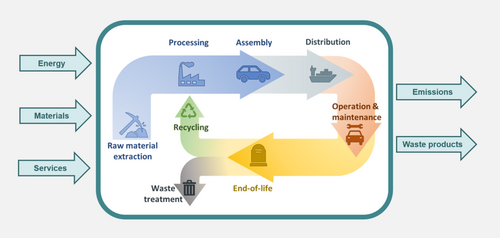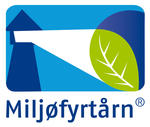For each of the product’s various life cycle stages, the use of materials, energy, and services as well as generation of emissions and waste products are considered when assessing environmental aspects and impacts, making LCA the best available method for estimating the overall environmental and climate footprint of products and services.

LCA is a tool that can be used for multiple purposes, for example to improve the environmental and climate footprint or identify relevant indicators for environmental performance. One can use the LCA technique to consider the environmental impact for the entire life cycle from “cradle to grave” or from “cradle to cradle”, or for parts of the life cycle such as from “cradle-to-gate”. An LCA can also provide insight as to where in the product value chain different emissions arise (as well as the sources), which can be used to identify improvement opportunities in the value chain.
When applied comparatively, LCA can be used to compare different technology alternatives. By comparing alternative technologies across multiple impact categories, one obtains increased insight about the product’s environmental profile compared to only considering one impact category (for example climate change). This holistic mapping provides insights about the importance of different life cycle stages as well as specific processes and components. If a technology is at an immature stage, prospective LCA can alternatively be applied with an eye to developing scenarios that consider future development.
At TØI we use LCA to study different battery, energy, and transport technologies as well as contributing to different expert groups and projects. These studies have different target groups and purposes, such as to support the direction of research development and/or inform decision makers.
TØI participation in expert groups
- International expert panel on sustainable batteries
- IEA Task 46 LCA av Electric Trucks, Buses, Two Wheelers, and Other Vehicles
Project work
FME MoZEES: Development of detailed and scalable cradle-to-gate inventory data for various Li-ion batteries. The battery inventory has already been applied to LCA studies of passenger cars and battery electric buses . Cradle-to-grave life cycle inventory for fuel cells are under development.
FME HyValue: LCA of various valye chains for hydrogen production pathways an case studies considering the use in martime sector.
CELECT (Circular Economy, Life Cycle Assessment, Electrification and Car Transactions): LCA og circular economy considerations of the entire Norwegian passenger car fleet, including second life applications of used e-car batteries.
FAME (curbing Fisheries’ and Aquaculture’s Maritime air Emissions): LCA of various marine energy carriers and their use in different propulsion systems.
BALSA (Bio-Sourced Alternatives for Lithium-Silicon Anodes): complete cradle-to-cradle LCA of developed battery, including consideration of circular economy for pathways for novel bio-based battery materials.
TØI employees working with LCA
PhD in Industrial Ecology focusing on LCA of Li-ion batteries. Linda is a senior researcher who has worked extensively with LCA through research, education, and consulting, and is internationally recognized as an LCA expert on Li-ion batteries and electromobility. She has been responsible for the LCA course taught at a master’s degree level at the Norwegian University of Science and Technology and worked with several experts in their field, including Nobel price winner Stan Whittingham. She has published several reports and articles on batteries and electromobility, for instance in Nature Nanotechnology and Nature Sustainability. A complete list of her publications is found on Google Scholar.
PhD in Physical Chemistry focusing on energy technologies. Rebecca is a senior researcher who has worked on LCA of novel energy and transport technologies. A complete list of her publications is found on Google Scholar.
PhD in Environmental Systems Analysis with focus on LCA of electromobility. Anders works as an expert advisor at TØI as well as an associate professor at Chalmers University of Technology where he teaches and supervise students in sustainable transportation, battery systems, and LCA. Anders’s research investigates how technologies for electric propulsion change the environmental impacts of road vehicles and other types of vehicles for transportation and industry. A complete list of his publications is found on Google Scholar.
Relevant TØI publications
- Charging sustainable batteries | Nature Sustainability
- Environmental life cycle implications of upscaling lithium-ion battery production | SpringerLink
- Life cycle assessment of battery electric buses - ScienceDirect
- Estimating stocks and flows of electric passenger vehicle batteries in the Norwegian fleet from 2011 to 2030 - Thorne - 2021 - Journal of Industrial Ecology - Wiley Online Library




